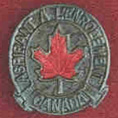Context
Not everyone attempting to enlist in the Canadian Forces met the existing minimum medical (physical) standards. Initially, no distinguishing button was issued to those persons rejected for failing to meet the standards. Although a Committee on War Service Badges had recommended on 27 October 1939 that two badges be established; a SERVICE badge for those voluntarily attested for active service beyond Canada and a RESERVE badge for those medically exempt (among other reasons); that recommendation was not acted upon. Instead, rejected applicants for service in the army were issued with form M.F.M. 12 (Militia Form M.12) - Certificate of Medical Unfitness for Service in the Canadian Active Service Force. This form did not satisfy the need for an easily identified indicator of exempt status however, and rejected applicants suffered in the eyes of the public as a result.
There were many requests from the general public and veterans organizations for a suitable badge and on June 26, 1941 the Adjutant-General informed the Minister of Defence that he would be discussing the matter at a meeting of the Awards Board. The result of the demands and the meetings was the enactment, by Canada's Governor General, The Earl of Athlone, of Order in Council P.C. 7893 on Saturday, October 11, 1941, (retroactively effective September 1, 1939) to create a badge to identify the medically unfit volunteers and distinguish them from those who had not yet volunteered.
Eligibility and Criteria
Order in Council P.C. 7893 defined those eligible for the award as:
Persons who have voluntarily declared their unqualified willingness to serve in and beyond Canada in the Military Forces of Canada, and who are refused enlistment by reason of their not possessing, due to no faults of their own, the necessary qualifications then required for enlistment in the Naval, Army and Air Forces of Canada.
Description
The authorized badge was silver or rhodium plated copper or gilding metal with a red enamel maple leaf. This was illustrated and described in Ottawa's Evening Citizen of Thursday 15 October 1941. The badge actually issued however, was blackened copper with a red maple leaf.
